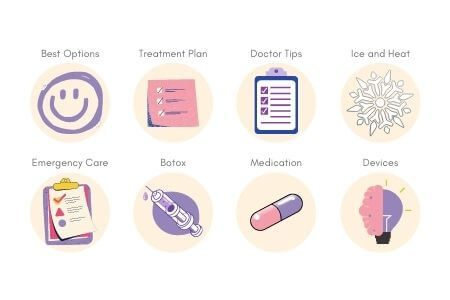- Home
- Migraine Treatments
- Migraine Specialists Emergency Care Tips
COMPLETE MAGNESIUM SUPPORT
My Top Choice - Magnesium Breakthrough - The ONLY supplement with all 7 essential magnesium types in one formula. Most only have 1-2 types, leaving you deficient.
Migraine Specialists Emergency Care Tips
People have different expectations from migraine specialists. What kind of doctor is a headache specialist?
Normally that's a neurologist. BUT... not all neurologists treat migraine. You’ll need a referral, and a few other things... so here are some tips to save you time and tears.
My #1 Choice in Magnesium Supplements
What are you looking for in a doctor? Do you want aggressive or passive treatment? Do you prefer s/he be a good listener, sympathetic and patient?
Are reputation, credentials, technical skills and experience important? They should be!
Bedside manner, personality and communication skills are not a given with specialists.
How does the office run, do you have to wait weeks or worse months to get in to see them?
I never thought about these things, I just went to who I was sent to. I never even asked a specialist if they had good results with migraines. It took me over 10 years to learn I could shop around for someone who I liked and trusted.
So take just a few minutes and ask yourself... what’s your definition of a good migraine doctor? What’s on your list and why?
Seeing a doctor for your headaches the first time is a bit like going out on a blind date.
~ Dr. P. Rizzoli et al.
Seeing your general practitioner for primary-care or family doctor is a good first step, most doctors are familiar with available migraine treatments, but not all doctors may be able to give you as much help as you need. Plus your main doctor will be providing your prescription refills for the course of your treatment. They must be kept in the loop.
If you are not getting efficient pain relief or are not getting any better, you must consider seeing a migraine specialist or neurologist. And, not all neurologists deal with migraines. Don’t wait too long to find effect pain relief or formulate a treatment plan with your migraine specialist.
There is no blood test to prove you have migraines, so explaining your symptoms to your migraine specialist is the only way s/he can diagnose your condition. And you may need to see a number of migraine specialists before you get the results you want. Not too many, but be prepared for more than one!
Get Your Migraine Specialist to Help You Prepare An Emergency Care Plan In Advance
Authors of The Migraine Solution
say "someone who has recurring migraines should be prepared for
emergency situation even when they don’t end in a trip to the ED." ¹
They have some other essential recommendations:
• Keep an accessible list of important details about your migraines including: your doctors name and phone number, your diagnosis, and other emergency contacts like your migraine specialist.
Include medications you take, both preventive and abortive with dosage and frequency. I can recommend printing emergency contact cards from the Red Cross (click here to print these two off - America, Australia) and writing your medications on the back. I keep mine in my wallet.
• Keep a list for family support details in case of emergency. Who will take you to the hospital, who will pick up the kids after school, who will call your work, for a few examples. Make sure your support person knows where your list is and who else is involved.
If you are single or alone, as we can be, keep a list for yourself. Put your important numbers in your cell phone or on speed dial. We can’t think straight with a migraine, especially if it’s an emergency attack. Be prepared.
• Check with your general doctor for emergency care, after hours phone numbers. Ask your migraine specialist for the same phone numbers and an emergency plan. You need to know what steps to take when your medication fails to work and you need to visit the emergency department.
Which emergency department does your doctor work from, which one is closest to you? Will your doctor meet you there, or do you need a referral letter for particular medications to carry in your purse or wallet.
• Ask your doctor and migraine headache specialist about "rescue medications" you can use instead of visiting the emergency department. Many of these rescue drugs have stronger side effects, and long term use is not recommended. They are never the first line of treatment, just useful if you cannot make it to an Emergency Department.
• Find the best delivery system for you if you cannot swallow tablets: suppository, nasal spray, inject able or melting wafers.
• Make sure you and your doctor are on the same page with your migraine treatments. As your doctor will need to prescribe your medications on a continuing basis, you will need to keep him or her informed what the migraine specialist prescribes.
Rizzoli et al believe that
“the doctor’s role is to offer advice about managing the overall pattern of your headaches, and the patient’s role is to carry out and test different management strategies for acute migraine episodes.
Of course, for times when you truly need your
doctor’s immediate advice, most doctors will do their best to help. However, it’s important to keep things in perspective: No
doctor can be there to treat each and every individual headache or
offer immediate advice about changes in treatment strategy.” ¹
This
means you need to become your own doctor when you need to be, so it’s
important to pay attention in their office. The best you can anyway.
You need to see them when you are migraine free so you can think
straight. Taking notes helps to refer back to later, if you forget some
of what they told you to do or experiment with.
My Own Effective Treatments
I am so thankful for the triptan migraine medications, in particular Naramig, and ice packs as you know! These all work for me. Give them a try.
WANT MORE TIPS? Subscribe to my newsletter and follow along on Facebook and Pinterest for all of the latest updates.
MIGRAINE TREATMENTS Related Articles
How to be more MIGRAINE SAVVY right now...
Ref: Rizzoli, P MD, Loder E., MD and Neporent L. (2011) The Migraine Solution: A Complete Guide to Diagnosis, Treatment and Pain Management. St. Martin's Press: NY. (pp. 200-203). Updated Feb. 13, 2020


















